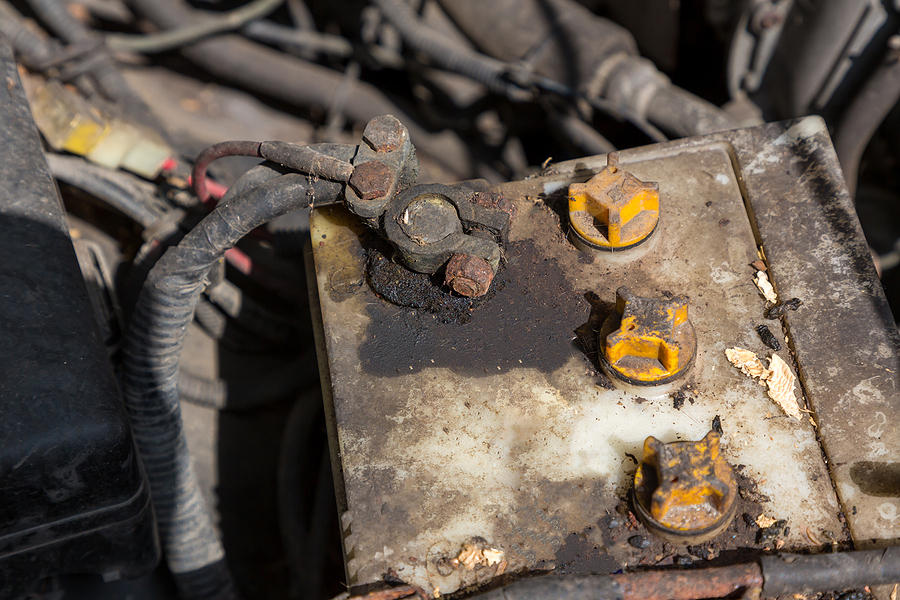A dead car battery often feels like an unexpected nuisance, but what you do with it next has a lasting impact. Tossing it in the trash might seem like the easiest option, but it’s a choice that carries serious consequences for both the environment and public health. In Indianapolis, there are specific guidelines for handling used car batteries, and understanding them is crucial.
This guide will walk you through everything you need to know about proper car battery disposal in Indianapolis. We will explain why responsible disposal matters, where you can take your old batteries, and how to handle them safely. By the end, you will have the knowledge to dispose of your used car battery in a way that protects our community and environment.

Why Proper Car Battery Disposal Matters
A used car battery isn’t just a piece of plastic; it’s a container filled with hazardous materials. A typical lead-acid battery contains sulfuric acid and lead, both of which are highly toxic. If a battery is left in a landfill or dumped illegally, these substances can leak into the soil and contaminate groundwater.
Environmental Hazards
Lead is a potent neurotoxin that can cause severe health problems in humans and wildlife, even at low levels of exposure. When it enters the water supply, it can harm aquatic life and eventually make its way into our drinking water. The sulfuric acid is highly corrosive and can damage soil quality, making it difficult for plants to grow.
Local Regulations in Indianapolis
To prevent these dangers, Marion County has established strict regulations against the improper disposal of hazardous waste, including car batteries. These rules are enforced by the Indianapolis Department of Public Works. Dumping a car battery illegally can result in significant fines and legal penalties.
These laws are not just about punishment; they are in place to safeguard our city’s natural resources for future generations. It’s essential to stay informed by checking the city’s official website for the most current car battery regulations.
How to Recycle Car Batteries in Indianapolis
Fortunately, recycling a used car battery in Indianapolis is simple and convenient. Nearly 99% of a lead-acid battery can be recycled, making it one of the most successfully recycled consumer products. Here’s where you can take your old batteries:
Local Auto Parts Stores
A few major auto parts retailers might have a battery recycling program. Chains like AutoZone, Advance Auto Parts, and O’Reilly Auto Parts will accept your used car batteries, often at no cost. Some of these stores may offer an incentive such as:
- Store Credit or Discount: When you purchase a new battery, you’ll often pay a small “core charge.” You can get this charge refunded by returning your old battery within a specified timeframe.
- Gift Cards: Some retailers may provide a small gift card in exchange for your old battery, even if you aren’t buying a new one.
Automotive Recycling Centers and Scrapyards
Specialized junk car buyers, auto scrapyards, and automotive recycling centers in the Indianapolis area are equipped to handle used car batteries. These facilities are experts in dismantling batteries safely and recovering valuable materials.
Some may even offer a small cash payment for your old battery, depending on current market prices for lead. A quick search for “car battery recycling Indianapolis” or “auto scrapyard near me” will provide a list of local options.
Marion County ToxDrop Sites
The city of Indianapolis operates ToxDrop sites where residents can safely dispose of various types of household hazardous waste, including car batteries. These sites are free for Marion County residents. It’s a good idea to check the ToxDrop schedule and accepted materials on the Indy Public Works website before you go.
Contact Us to Get Paid for Your Battery! 💱
Safety Precautions for Handling Used Car Batteries
Before you transport your battery for recycling, it’s vital to handle it with care to prevent accidents.
- Wear Protective Gear: Always wear gloves and safety glasses when handling a car battery. The residue on the outside can contain lead dust, and there is always a risk of exposure to acid.
- Keep the Battery Upright: Transport the battery in a secure, upright position to prevent it from tipping over and leaking acid. A sturdy plastic container or a cardboard box can help keep it stable.
- Check for Damage: Inspect the battery for any cracks or leaks. If you notice any damage, place it in a leak-proof plastic bag or container before moving it.
- Avoid Sparks: Keep the battery away from open flames, sparks, or metal tools that could cause a short circuit. The hydrogen gas produced by batteries is highly flammable.
The Positive Impact of Recycling Car Batteries
Choosing to recycle your car battery does more than just keep toxic materials out of landfills. It creates a circular economy where valuable resources are reused, reducing the need for new mining and manufacturing.
The lead plates, plastic casing, and sulfuric acid can all be recovered and repurposed. The lead is melted down and used to produce new batteries, the plastic is crushed and turned into pellets for new battery cases, and the sulfuric acid is either neutralized and converted into sodium sulfate for use in fertilizers and detergents or reprocessed for use in new batteries. This process conserves natural resources, saves energy, and significantly lowers the environmental footprint of battery production.
Car Battery Disposal FAQs
Why is battery recycling important?
Recycling batteries is essential because it reduces the need for mining new resources, conserves energy, and prevents hazardous materials from polluting the environment. Proper recycling ensures that valuable materials like lead, plastic, and sulfuric acid are repurposed effectively.
What types of batteries can be recycled?
Many types of batteries can be recycled, including lead-acid batteries used in vehicles, lithium-ion batteries found in electronics, and nickel-metal hydride batteries from rechargeable devices. Always check local recycling guidelines to confirm accepted battery types.
How should I prepare my used batteries for recycling?
For most batteries, it’s important to store them in a cool, dry place and avoid mixing different types. For damaged or leaking batteries, seal them in a non-conductive material like plastic to prevent accidents. Follow specific instructions from your recycling center.
Are there any risks to improperly disposing of batteries?
Yes, improper disposal of batteries can release toxic chemicals into the environment, contaminate water supplies, and even pose fire risks in landfills. Recycling ensures these risks are avoided.
Where can I recycle my batteries?
Batteries can often be recycled at dedicated recycling centers, participating retail stores, or through municipal waste collection programs. Many communities now provide convenient drop-off points for used batteries.
Key Points
Proper car battery disposal is a small action with a significant positive impact. By taking a few extra minutes to recycle your used car battery, you are helping to protect Indianapolis’s soil and water, conserve valuable resources, and comply with local laws. The process is easy, often free, and contributes to a healthier, cleaner community for everyone.
Don’t let that old battery sit in your garage. Trust our Indianapolis automotive scrapyard to recycle your used or broken car parts responsibly. We adhere to all EPA regulations and pay cash on the spot.
Related Post: How to Jump Start a Dead Car Battery Safely and Effectively
